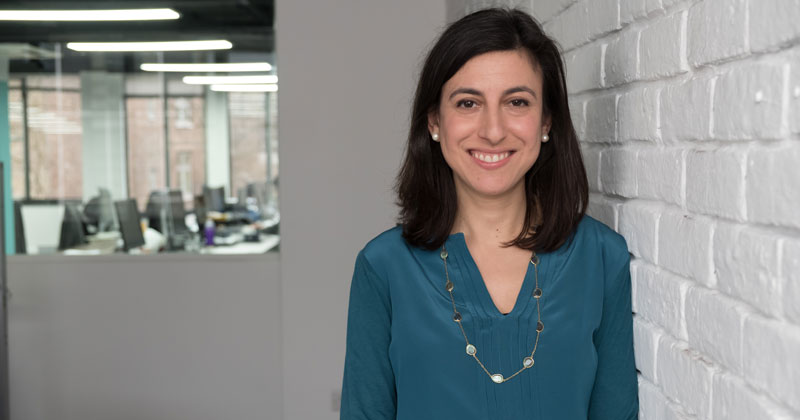Claudia Harris, the CEO of the Careers and Enterprise Company, wants to give young people everywhere the kind of opportunities to network with employers that she was given herself during her teenage years at the prestigious St Paul’s independent school in London.
“I was exposed to lots of very impressive-looking businesswomen who walked around and talked about their jobs and really inspired me to go and pursue the career that I did pursue, which is consulting and in business,” she explains, insisting that it was these women, rather than her entrepreneur father, who inspired her.
Another of the reasons she feels passionately about this space is that her mum – previously a housewife – got her first full-time job at 50, as a lecturer at Kingston University. “She absolutely loved working,” relates Harris. “And I just saw the impact that had on her personally. It’s not just about your job, it changes your life. I’ve always felt that having a job you like is a really profound part of your human experience.”
I was exposed to lots of very impressive-looking businesswomen who walked around and talked about their jobs
If employers were so keen to visit her school, they should be keen to visit more schools. “Why are they going to a few schools? It’s a huge opportunity,” she exclaims. “Why wouldn’t you just make it easier for them to go to all schools?”
Which was precisely the founding idea behind the CEC in December 2014. The education secretary of the day, Nicky Morgan, envisaged it as an “employer-led” umbrella organisation that would improve careers education for children aged 12 to 18, support greater engagement between schools, colleges and employers, coordinate (but not provide) activities, and “work closely with the education and careers sectors”. It would also eventually become self-funding – a goal they are currently working towards.
Applying for the CEO job was “a no-brainer”, says Harris, who explains that she’d focused on employer engagement with schools during her time as a partner at the management consultancy firm McKinsey.
“The role came up and then someone told me about it when I was telling them what my great passion was, and they were like ‘have you heard of this organisation? Maybe you should think about applying for it’.”
The government has been accused of squandering resources by running two careers services in parallel – the CEC and the National Careers Service – notably by the chair of the education select committee Robert Halfon.

So is there duplication? The history of national careers guidance policy is convoluted, with four major changes since the Employment and Training Act first gave the secretary of state responsibility for ensuring that all young people had access to guidance back in 1973.
The most recent changes can be traced to the Education Act 2011, which devolved that responsibility to schools, a move that has been heavily criticised due to the perceived conflict of interest, i.e. that schools would prefer to hold onto their students rather than direct them elsewhere. Local authorities are no longer required to provide a careers service for anyone but young people deemed to be vulnerable and disadvantaged.
We are obsessed that we spend this money correctly. Obsessed with it
The NCS was launched in April 2012, and the CEC three years later, resulting in general confusion. But Harris thinks that apart from the names – she hasn’t been able to persuade the NCS to enter into a joint rebranding exercise – the distinction between the two is “actually quite clear”. The NCS, which is highly rated by customers, provides confidential and impartial advice over the phone, online or face-to-face, from qualified careers advisers, for anyone over the age of 13, including adults.
But no organisation had focused on putting employers in touch with pupils or creating “programmatic career support for young people”, she explains.
The massively bumped-up role handed to the CEC in the government’s December 2017 careers strategy did little to assuage its critics, especially given how much of the press to date – not least from this newspaper – had been negative, lambasting them for achieving little with their £70 million of state funding.
Harris appears shocked that anyone would think this: “We are obsessed that we spend this money correctly. Obsessed with it. We know that money is tight and that you’ve got to have an impact.”

The Education Endowment Foundation is currently running randomised control trials to measure impact on young people’s motivation, engagement and ultimately, destinations, although this last one will obviously take a few years.
In the meantime, why didn’t they make an effort to correct the negative media perception?
“We take feedback very seriously, and we listen to it all the time, and if there are things that we need to improve we work incredibly hard to improve them,” she says. “We thought that some of it was just wrong. I mean, literally, some of the numbers were wrong. We were just unbelievably careful about how we used the money.”
The £70 million of government funding was stretched over an entire parliament, she explains, with between £5 and £6 million every year spent on careers coordinators and the same amount on programmes.
We take feedback very seriously, and we listen to it all the time
Over the past three years, they have built a network of careers coordinators across England, each of whom is responsible for connecting 20 schools and colleges with local businesses, employers, careers service providers, mentoring organisations and charities. Once the CEC has rolled out the programme fully, the 120 coordinators will have burgeoned to almost 200, and every single mainstream school and college in England will have access to a designated local coordinator.
Each school is also matched with one enterprise advisor – a volunteer from the world of work – to help the headteacher or careers lead develop a plan. This is based on an initial self-evaluation done through the CEC’s online Compass tool, designed to assess how well the school is achieving the Gatsby good career guidance benchmarks – a set of eight standards defining world-class career guidance that were developed as part of an international study in 2013.

Their second major arena is programme support, and they provide funding to about 100 national and local projects that provide high-quality employer engagement activities for schools. Seventy-five per cent of their programme spend is concentrated in the designated social deprivation “cold spots. Green
Power is one example, an organisation that helps students to build and race kit cars.
In the Humber region, the CEC paid for 30 cars for 30 schools, then on the back of that several businesses came in and funded another 40 cars.
“So we had this huge race,” she enthuses, having got to drive one.
The theory behind the CEC approach is simple: research by the Education Employers Task Force has shown that young people who have four or more encounters with the world of work earn 18 per cent more on average than those that don’t, and are 86 per cent less likely to be NEET.

This is why one of the eight Gatsby benchmarks states that every year, from the age of 11, pupils should participate in at least one meaningful encounter with an employer, “meaningful” being “one in which the student has an opportunity to learn about what work is like or what it takes to be successful in the workplace”. At the moment this is happening in only about 40 per cent of schools, according to their survey.
Harris speaks with an almost religious belief in the power of evidence-based interventions to improve outcomes. “The three things young people need are engagement with the world of work, information, and help making a plan,” she assures me. “The schools who do best on Gatsby, the one thing they have in common is that they have a careers leader.” Then again, she does have a story in her own past that could be interpreted as a Damascene conversion.
Early in her career, she spent a year in the prime minister’s delivery unit, in the team tasked with reducing the MRSA superbug by 50 per cent in three years.
“This doesn’t seem to be achievable,” she announced in her very first meeting. “I’ve looked at all peer comparisons in other countries and there is no example of this ever having happened.”
The schools who do best on Gatsby, the one thing they have in common is that they have a careers leader
This was “not the right answer in government”, she was promptly told. She left after a year to take up a fully-funded MBA at Harvard Business School, but the team went on to deliver and even surpass their target, and she has kept in touch with many of her colleagues from that time: “I just learned a huge amount from the people I worked with”.
Harris is fortunate to have all the evidence at her disposal, with much of the groundwork having been laid by the Education Employers Task Force and the Gatsby Foundation. Confident in this knowledge, her company’s message is simple: “Schools: do Gatsby, here’s how. Employers: do encounters, here’s how.”
But what about those who fall through the gaps – surely one encounter per year is not enough? “We think you need more,” she agrees, adding that young people have to be able to talk to the employer and ask questions.
“The theory of change is you meet the first person, they do nothing for you,” she explains. “You meet the second person, you think, ‘I definitely don’t want to do that’. You meet the third and that’s actually useful because you’re like, ‘I really don’t want to do that! I’ve got to think about what I do want to do’. You meet the fourth person and they describe their job and you think ‘that’s something I can get excited about’.

“And the collective impact of it is that you don’t end up probably picking from what any of those people do, but you do end up thinking ‘I’m going to take control of this situation’. And that is the theory of change, and that’s why those multiple encounters work.”
This is also why diverse mentors are vital, because if you meet somebody “for whatever reason, they don’t have to look like you, they just remind you of you and they are doing something that you like to do, that creates a spark and a line between where you are now and where you can imagine being in the future.”
Research shows that young people need to be able to visualise their future in order to make plans and feel in control, she says: “so CSI causes a big uptick in forensics, like Bake Off and baking, because it’s real and you can imagine it. It is just so much about the visual.”
She loves to get out in the field and is herself an enterprise advisor for the same west London comprehensive that her dad used to attend in his day.
“Because how do you know anything if you’re not on the ground? I’m a huge believer – and that’s what I learned at McKinsey – that you’ve got to be in schools, talking to businesses, out and about, in the cold-spot areas, talking to those people, understanding what their challenges are, to be effective.”
Claudia’s CV
2015 – present: CEO, the Careers and Enterprise Company
2008 – 2015: Partner, McKinsey
2006 – 2008: MBA, Harvard Business School
2005 – 2006: Health team member, prime minister’s delivery unit,
2003 – 2005: Business analyst, McKinsey
1999 – 2002: Politics, philosophy and economics, Oxford University
It’s a personal thing
What’s your favourite book?
This is not an easy one; I read a lot. Lately, I’ve enjoyed Do not say we have nothing, by Madelein Thien. It’s a pretty intense novel and it’s basically about multiple generations of people in China through the communist era. Also Ready Player One, a sci-fi book. It’s amazing, I love sci-fi. And they’re turning it into a Spielberg film in a couple of months. I’m really excited about that.
What is a good gift for you?
I’m not very into things. Something thoughtful, like a nice book. If someone gave me a book that’s good that I would enjoy, that is like the ultimate gift.
What would you have done if you hadn’t taken this career path?
What would I have done? I did once want to be a journalist. I edited my school newspaper.
What was your position in the family hierarchy growing up?
I was the elder sibling of two. I’m very close to my little sister, she’s amazing – she’s a lawyer now and is about to get married. She’s three and a half years younger than me. She was cooler, I was less cool. In that sense 100% per cent typical!
What motto would you put on a billboard?
Find what you love and do more of it.














Your thoughts